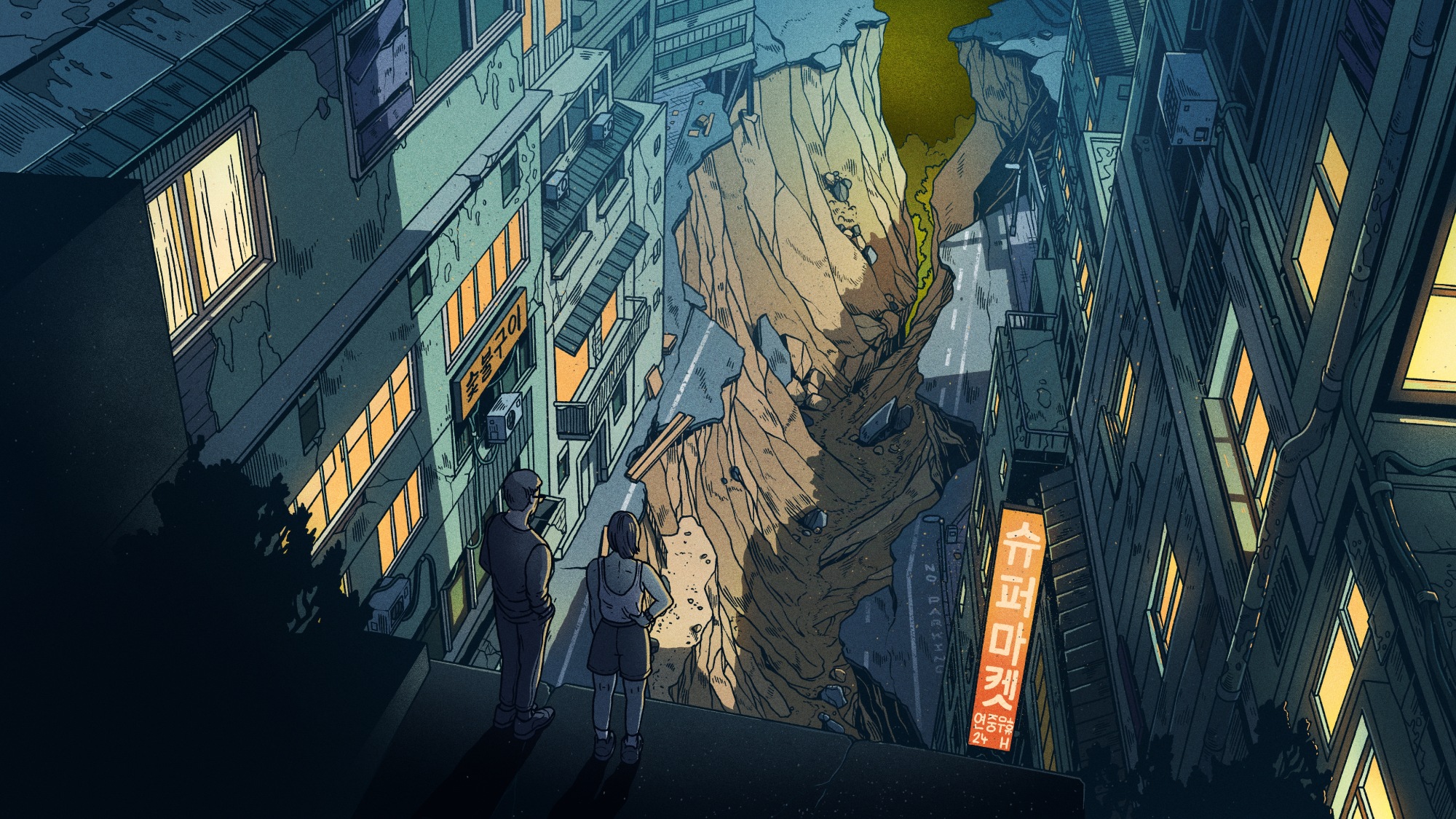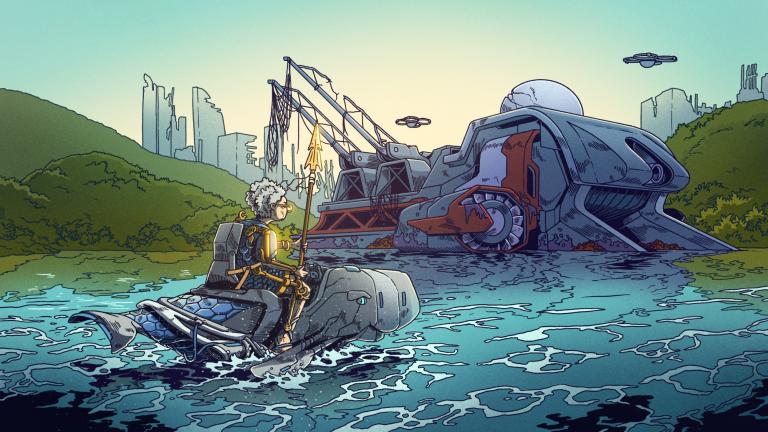Imagine 2200, Grist’s climate fiction initiative, celebrates stories that invite us to imagine the future we want — futures in which climate solutions flourish and we all thrive. Discover the 2025 contest winners. Or sign up for email updates to get new stories in your inbox.
The streets of Koreatown are wounded. Battle scars from the earthquake years gouge Western, Olympic, and Sixth, fissures so wide and deep Christina used to believe the Grand Canyon had grown legs and walked itself across the desert and into their neighborhood. In the worst places, the city’s innards are exposed, rusting pipes and crinkled plastic tubes gaping out between the asphalt like offal. Nobody remembers what this secret urban nervous system was used for anymore — lightrails, solar energy, and MRUs have long since made them obsolete — and nobody in charge of anything important cares enough about 150 blocks of Koreans and Latinos and whomever-else to fund a proper cleanup, so the wounds remain.
There’s a big, fat fissure right in-between Christina’s apartment building and the Korean BBQ joint where she works weeknights. The crack is just long enough and wide enough to be a pain in the ass, especially after a long shift when she comes home stinking of grill smoke and old sesame oil. The smoke triggers her little sister’s asthma, so the first thing Christina does when she gets home is stand in the doorway and strip down to her underwear, even though it doesn’t make her feel any cleaner and Sadie still needs to fill her inhaler prescription every month. The smell of pollution coats the insides of her nostrils so that even when Christina sleeps, she dreams of burning.
But she does her little strip-down routine anyway, stepping carefully out of her black slacks and crumpling up her stained apron, because she and Sadie got in a fight over the weekend.
In a childhood that now feels more far-off than the budding Martian colonies, Christina used to press her nose against the bathroom window and watch a group of daredevils rappel into the chasm on their street, cameras protruding from their helmets like antennae. She would fantasize about strapping into the overcomplicated, brightly-colored polyester harnesses once her limbs stretched out to their full length and her mother stopped worrying so goddamn much.
When Umma died, Christina learned one of the colder facts of life: Someone must always be around to worry. Like a parasite, her mother’s worry latched onto her, and when Christina found Sadie’s breath frosting the same window as she watched some university-looking people disappear into the crack with scanners and spades, she grabbed her by the wrist and dragged her away.
Christina pauses in just her tank top, the day’s tips crumpled in her left hand. Their building, like most in the city, overflows with bodies. Human bodies, droid bodies, cat bodies, crusty white dog bodies. They add their voices to the systematic hum of the building’s Moisture Recycling Units and the back-of-your-throat buzz of the solar panels scaling the roof and walls like armor. The walls are so thin that normally, Christina can hear Sadie all the way from the elevator: the rhythm of her fingers against her school-issued TouchBook and the grating sound of old cartoons, which she’ll switch off and lie about when she hears Christina’s keys in the door. It’s like a song she knows by heart, a frequency her entire body is attuned to.
Today, however, there is only silence.
Christina pauses in the hallway, straining her ears, but the only sound that fills them is that of her own rushing blood.
She chucks aside her smoke-stained clothes, pulls on some acceptably clean pants, and heads for Sadie’s room. She must be in there. She has to be. Argument or no, Sadie isn’t the sort to just run off.
And indeed, someone is sitting in Sadie’s desk chair, the same old sticker-battered TouchBook resting in their lap. But this someone isn’t her sister.
Christina lets out a sharp shout and grabs the first blunt object she finds, which turns out to be a Pokémon plush doll. It bounces harmlessly off the strange man’s head.
“No — please, wait!” He jumps to his feet, hands raised. He’s certainly an adult, despite the squeaky tenor of his voice, and the realization that a strange adult man is in her 12-year-old sister’s room fills Christina with a rage she’s never known. “I’m so sorry, I didn’t realize anyone would be home —”
“Where is she?” Christina grabs an umbrella next, wielding it threateningly.
“I don’t know. We had arranged a meeting — I’m her science teacher, Mr. Park-Llewelyn? Dafydd? We met, very briefly, at parent-teacher night.”
“Her science teacher,” Christina repeats dryly. She doesn’t lower the umbrella, although the man’s face does look vaguely familiar.
“Yes — well, climate solutions teacher, to be exact.” He swallows and adjusts his glasses, and somewhere in that motion, Christina sees a glimmer of truth. “Sadie didn’t mention our meeting?”
It’s a question. All of him, in fact, seems to be something of a question. He’s younger than she would have expected for a teacher, but he dresses like a character out of a 20th-century film. Old-fashioned-style brogues, spectacles, even a goddamn sweater vest. Under her glare, Mr. Park-Llewelyn turns a faint shade of pink.
“What are you doing here?” she demands, crossing her arms.
“Sadie’s missed school today, which I’m sure you know isn’t like her at all.” He blinks at her from behind his gold-rimmed glasses. “We had a meeting set up to discuss her inclusion in the Green Students Alliance —”
“What the hell is that?”
“Oh — she didn’t tell you?” Christina’s eyes narrow, and Dafydd’s cheeks deepen from pink to crimson. “I’m sorry, I just assumed — it’s a student-run organization at the high school that I supervise. They take on various community projects, like street cleanups, community gardens, and even writing up proposals and presenting them to the city. Sadie got really excited about the group, so we were talking about a way to … Are you alright, Ms. Cho?”
Christina dabs the corner of her eye and is horrified to find it wet.
Ever since Umma, she and Sadie have lived their whole lives in a bubble. There wasn’t a thing Christina didn’t know about her younger sister, and vice versa. But now she’s out living an alien life, one where some bespectacled geek Christina has never seen before speaks about her with admiration and familiarity, and it stings.
“Yeah. Grill smoke.”
Dafydd’s eyes soften around the corners. “I found the door unlocked, with no sign of her. I just want to make sure she’s alright.”
Christina nods, short and sharp. “Me too.”

It is a point of pride that Christina has never utilized Sadie’s wrist com tracker. Trust has always been paramount, and Christina still remembers the time her left arm lit up like a Christmas tree just as Matty Romero leaned forward to kiss her. That sort of humiliation is hard to forget.
“At least she’s in the building,” Dafydd offers. They’re taking the emergency stairwell to the roof, two steps at a time, and sweat slicks Christina’s hairline. (The tracker, alas, has no sense of height.)
Christina glances down at her portable TouchBook and curses. Sadie’s location has already shifted since she last checked, and it keeps fading in and out and reappearing in random locations, as if something is interrupting the signal.
“Let’s just rule the roof out and keep going,” she grumbles.
Sometimes Christina’s world goes blurry around the edges. Her physician says she needs glasses, but you don’t need glasses to work at a barbecue place. What is there to look at in this world of theirs, anyway? The sky over the city is permanently gray, and so are the streets, and the buildings. Even the people around her seem to be bleeding away color day after day. Because of this, Christina has never gone up to the roof before. She knows what kind of view awaits her.
So when she and Dafydd unstick the door to the roof, the blur of green comes as something of a surprise.
The rooftop is opulent with plant life. It is more green than Christina has seen in her 25 years of life combined, more green than she thought was left in the world. A rarefied, spectacular green, not the pasty hue of the genetically engineered Vegetable Supplement or the hungry neon of the algae gnawing at the surface of the L.A. river, but all of those hues combined along with several hundred more. Not even the highest quality sims at the local VR-bangs feature colors like these.
“Remarkable!” Dafydd exclaims, and Christina shoots him an incredulous sideways glance. “Of all the green roofs I’ve seen, this has to be the most abundant.”
“I didn’t think we had the money,” she says softly, stepping into the softly waving strands of grass. It blankets most of the roof, leaving space only for a tangle of narrow paths that lead to a terrace full of hanging pots and several raised garden beds. A few elderly residents in shiny plastic visors and pink dishwashing gloves roam amongst the plants, chattering intermittently in a mix of Korean, Spanish, and English. Christina pauses to run her thumb down the fleshy white spine of a head of Napa cabbage. The same raised bed hosts a bristling bush of fragrant, heart-shaped leaves, each one as wide as her hand.
“Perilla,” Dafydd says, just as Christina recalls the proper word and says, “깻잎.” They exchange a startled glance. To her surprise, he smiles.
Mrs. Im from the third floor comes up to them. Her wrinkled face is sun-browned and sweet, like a date. She says something in quick Korean, and Dafydd and Christina both shake their heads apologetically.
“Sadie,” Mrs. Im rasps. Her calloused hands clutch Christina’s.
“I think she’s been coming up here to help,” Dafydd says, and Christina could smack herself. How could she not see Sadie’s touch at work in this place, from the bubbly handwriting labeling each plant to the lupines — her favorite — growing in vibrant purple spikes alongside the hot pepper plants? She lets Mrs. Im drag her along, through the jeweled garden and past the veil, to the roof’s edge.
“There,” Mrs. Im says, pointing at the fissured road 10 floors below. “Down.”
“Oh, God.” Christina clutches the edge of the roof, the grit indenting her palms. “Dafydd, she’s in the ground.”

Back when people first started venturing into the fissures, the city put barbed wire and LAPD around them. This only lasted a month or so, and as the other cracks throughout the city got filled in one by one, Koreatown was eventually forgotten.
Only teenagers in search of a smoke spot and idealistic fools looking for a way to heal the neighborhood venture down there now. Some of them have accomplished small miracles, like the team of undergrads that managed to plug a major natural gas leak a few years ago and the single mother who campaigned until she got part of the Olympic crack filled in after her 2-year-old fell in. But for the most part, the fissures are something to be avoided and ignored. The rest of the world may be reforesting and sucking carbon out of the air and cleaning the oceans and lakes, but what are people like Christina, who can barely afford the monthly subsidy on their Moisture Recycling Unit, supposed to do?
Christina and Dafydd stand at the edge of the crevice. Her emergency flashlight casts a sickly beam of light into the abyss, illuminating jagged pipe ends and fraying cables.
Her wrist com chirps softly. Elevated heart rate. Recommended to remove stressors from your environment and practice circular breathing for the next two minutes.
Christina grits her teeth. They have no harnesses, no carabiners, not even a bicycle helmet to protect their skulls. But Sadie’s signal is on the move, and there is nowhere to go but down.
She takes the first step. A small cascade of pebbles rains down, into the dark.
Elevated and irregular respiratory rate.
Elevated blood pressure.
There’s a small ledge a yard down. She drops onto it, the impact reverberating through her knees. She still can’t see the bottom.
“Come down,” she shouts.
“Are you sure?” Dafydd’s voice trembles around the edges. “Shouldn’t we just call someone?”
“I’m not getting her in trouble.” She reaches out and grasps a dead cable, yanking on it to test its hold. She has no idea if it will be long enough or secure enough to get her to the bottom without killing her, but there is only one way to find out.
She wraps it around her waist as Dafydd scrambles down, the light glinting off his glasses.
“Don’t tell me we’re going to jump,” he groans once he sees her makeshift harness.
“I’m going to jump. You do whatever you want.” She wraps the cable around her knuckles twice.
“I can’t let you go down there alone.”
“Well, then, come on.” She holds out her hand.
After some hesitation, he takes it.

This deep inside the earth, the sky becomes like more than a distant memory. Night deepens as Christina and Dafydd travel further down the chasm. Christina’s wrist com won’t stop nagging her, so she shuts it off. When was the last time she did that? Let herself sink into silence and emptiness?
“Are you from around here?” she asks, when the quiet becomes too terrible to bear.
She feels, rather than sees, when he shakes his head.
“Cardiff, then Detroit. But my mom’s side is from here. Her family first came here in the 20th century.”
One hundred years of Koreatown ancestry. For many, this neighborhood is more of a motherland than Unified Korea ever will be, but why doesn’t it feel that way?
“It’s funny,” he carries on as they forge ahead, and even though she didn’t ask, she listens. “Even with my fissures, my mom says this place hasn’t changed a bit, and probably never will.”
“You don’t believe that.” Christina says flatly.
“No.” His voice drops to almost a whisper. “Not for a moment. Not while there are kids like Sadie and the Greenies.”
Unexpectedly, she snorts. “Oh, God. Please tell me you don’t call them that.”
“Hey, it wasn’t my idea.” He stops, so abruptly that Christina walks right into him. “Do you hear that?”
The flashlight’s beam wiggles up and down the layers of broken earth. Christina listens carefully, her hands still pressed against the planes of Dafydd’s back.
“Rain?”
“Better,” Dafydd says, starting forward again.
They follow the distant sound of rainfall to a widening in the fissure, almost a cavern. The first few drops land on Christina’s cheeks, and when she cranes her neck back and Dafydd shines his wavering spotlight toward the sky, the light glints off a familiar, heart-shaped reflection: Sadie’s glasses.
Sadie stands on a broad shelf of earth several yards above them, a green hose dangling from her hand. The drops turn into a fine mist that wets Christina’s face, kissing her cheeks and forming beads of dew on her lashes and lips. Sadie isn’t alone. A dozen teenagers stand on various outcroppings along the crevice’s walls. Most are accompanied by portable Moisture Recycling Units, bullet-shaped silver contraptions each the size of a Pekingese.
The earth beneath Christina’s feet — earth, not cement or gravel or asphalt—is rich and dense with moisture. Every foot or so, a new sprout protrudes from the dirt.
“You,” Christina calls out to her sister, already laughing from a mixture of relief and pure, exuberant joy, “are in so much trouble!”
“Don’t step on my tomatoes,” Sadie calls back. “Mr. Park-Llewelyn, is that you?”
One of the teenagers groans. “It was supposed to be a surprise!”
“They must have put this together without my knowing,” Dafydd murmurs, a dimple appearing in each cheek. “Some sort of … community garden? And a native plant nursery!” He kneels, cupping a small bundle of silvery leaves between his hands. “This is white sage, a California native that’s been threatened in the wild for almost a century. They must have grown it from seed — Oh!” He jumps back, startled, as a white-winged moth zips past his nose.
Christina laughs and reaches for his arm.
“Come on,” she says, eyes fixed on her sister, the lone star in the hazy night sky. “Let’s go.”
Lynn D. Jung is a speculative fiction writer from southern California. She currently resides in Wisconsin, where she is studying to obtain a master’s in science education. Her short fiction has appeared in Apparition Lit and the Icarus Writing Collective, and her long-form work is represented by Laura Crocket at Triada US. Lynn spends her free time identifying native flora and making YouTube videos about writing.
Stefan Große Halbuer is a digital artist from Münster, Germany, who has worked for brands like Adidas, Need for Speed, Samsung, Star Wars, Sony, and Universal Music, as well as for magazines, NGOs, and startups. Recently, he released his first solo book, Lines, a coloring book with a selection of his art from the last years.





